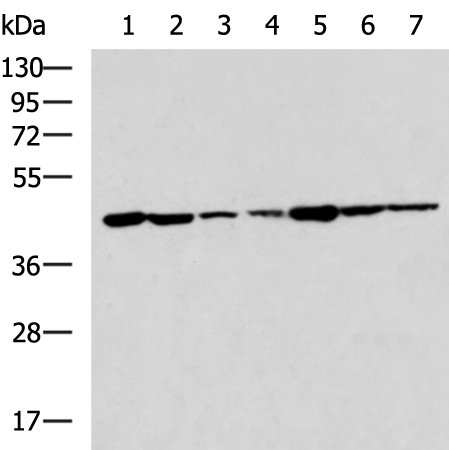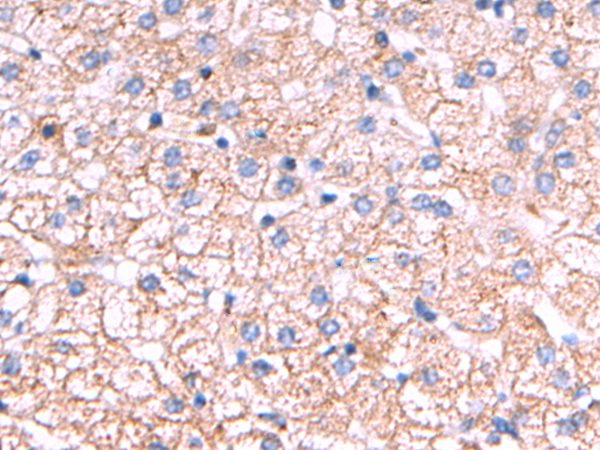

| WB | 咨询技术 | Human,Mouse,Rat |
| IF | 咨询技术 | Human,Mouse,Rat |
| IHC | 咨询技术 | Human,Mouse,Rat |
| ICC | 技术咨询 | Human,Mouse,Rat |
| FCM | 咨询技术 | Human,Mouse,Rat |
| Elisa | 咨询技术 | Human,Mouse,Rat |
| Aliases | GA; AGU; ASRG |
| WB Predicted band size | 37 kDa |
| Host/Isotype | Rabbit IgG |
| Antibody Type | Primary antibody |
| Storage | Store at 4°C short term. Aliquot and store at -20°C long term. Avoid freeze/thaw cycles. |
| Species Reactivity | Human, Mouse, Rat |
| Immunogen | Fusion protein of human AGA |
| Formulation | Purified antibody in PBS with 0.05% sodium azide and 50% glycerol. |
+ +
以下是关于PLGF抗体的3篇参考文献示例(内容基于公开研究领域知识,具体文献需根据实际检索确认):
---
1. **文献名称**:*Targeting placental growth factor/neuropilin 1 pathway inhibits growth and spread of medulloblastoma*
**作者**:C. Fischer et al.
**摘要**:研究证明PLGF抗体通过阻断PLGF/NRP1信号通路,抑制髓母细胞瘤的肿瘤生长和转移,并减少血管异常生成,为治疗此类脑肿瘤提供新策略。
2. **文献名称**:*Placental growth factor inhibition modulates tumor immune infiltration and enhances response to chemotherapy in colorectal cancer*
**作者**:M. Van de Veire et al.
**摘要**:该文献发现抗PLGF抗体可增强结直肠癌模型对化疗的敏感性,并通过调节肿瘤微环境中的免疫细胞(如巨噬细胞)浸润,抑制肿瘤进展。
3. **文献名称**:*The role of anti-placental growth factor antibodies in pathologic ocular angiogenesis*
**作者**:S. J. Park et al.
**摘要**:探讨PLGF抗体在病理性视网膜血管增生(如糖尿病视网膜病变)中的作用,显示其可选择性抑制异常血管生成,且较VEGF靶向治疗副作用更小。
---
如需具体文献,建议通过PubMed或Google Scholar检索关键词“PLGF antibody”“anti-PLGF therapy”等获取最新研究。
Placental Growth Factor (PLGF), a member of the vascular endothelial growth factor (VEGF) family, is primarily expressed in placental tissues, as well as in other organs like the heart and lungs under pathological conditions. It plays a key role in angiogenesis, inflammation, and vascular remodeling by binding to VEGF receptor-1 (VEGFR-1) and neuropilin co-receptors. Unlike VEGF-A, which is essential for physiological angiogenesis, PLGF is predominantly involved in pathological processes such as cancer progression, diabetic retinopathy, and preeclampsia.
PLGF antibodies are therapeutic or diagnostic tools designed to neutralize PLGF activity. In cancer, PLGF overexpression correlates with tumor angiogenesis, metastasis, and immune evasion; anti-PLGF antibodies aim to inhibit these processes. In preeclampsia, elevated PLGF levels are diagnostic biomarkers, but antibodies may also modulate placental vascular dysfunction. Preclinical studies show PLGF blockade reduces pathological angiogenesis with fewer side effects compared to VEGF-A inhibitors, as PLGF deletion minimally affects normal vasculature. However, clinical translation remains challenging due to complex PLGF interactions in disease microenvironments and variable efficacy across conditions. Current research focuses on optimizing antibody specificity, delivery, and combination therapies to enhance therapeutic potential.
×